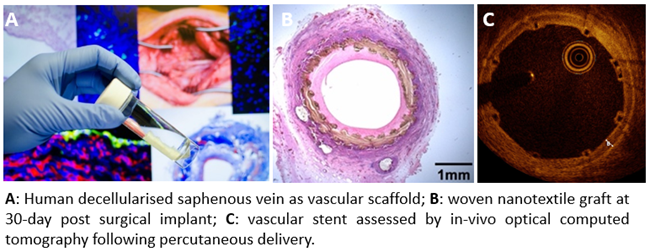Prof Raimondo Ascione and Prof Sarah George
Prof Ascione has a strong interest in developing new small vascular grafts and stents using tissue engineering technologies as an alternative to saphenous vein grafts to improve the long-term benefit of patients at risk of heart attack or limb amputation. Others have demonstrated poor outcome of autologous, synthetic and tissue engineered small vascular grafts for coronary and peripheral artery bypass grafting surgery.
Research undertaken jointly by Prof Ascione’s and Prof Sarah George’s groups is focusing on a number of tissue engineering technologies utilising decellularised biological scaffolds including blood vessels as well as synthetic scaffolds of various compositions. The new devices are assessed in culture, bioreactor, and large animal models at the Bristol TBRC facility. They are evaluated with or without functionalisation with seeded cells and/or factors aimed at improving the vascular remodelling toward arterialisation and thereby their long-term effectiveness in-vivo as opposed to veins. In the field of biodegradable polymers and modified electrospinning this long-standing joint research line has confirmed the preliminary feasibility of obtaining a 3-layer small vascular graft. In addition, in collaboration with colleagues from Amrita (India), we have recently validated the preliminary in-vivo feasibility of a novel tissue engineered biodegradable vascular graft made from woven nano-textile technology.
Finally, Prof Ascione has also secured Innovate UK funding with Arterius-Ltd, a UK-based company, to develop and test at TBRC a new biodegradable vascular stent. This project was recently completed in collaboration with colleagues from Bristol including Profs Sarah George, Tom Johnson and Jason Johnson.

